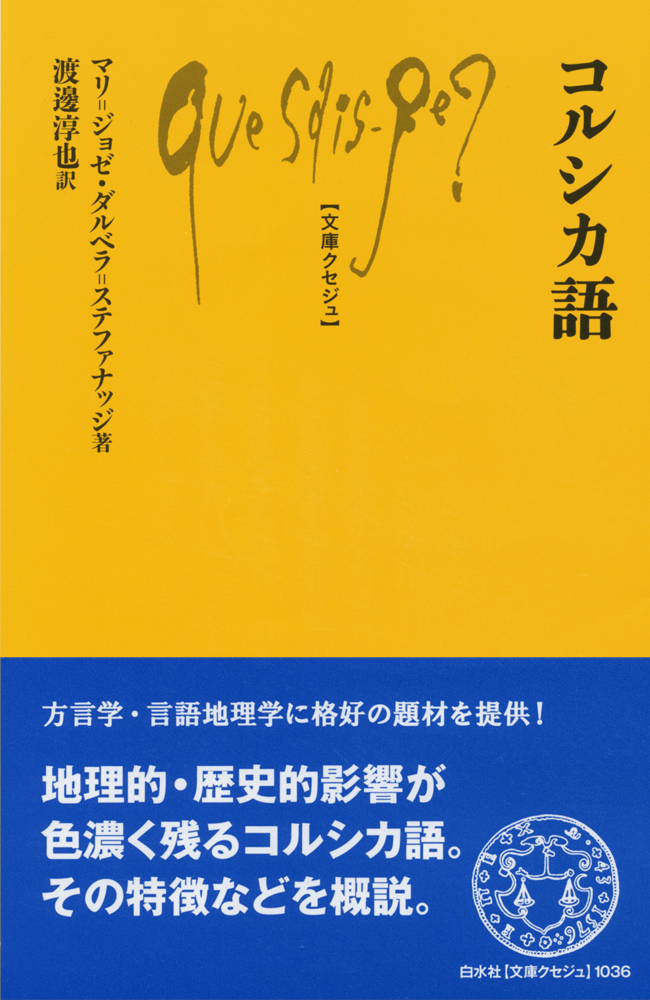
Title
Q1036 Korushika-go (The Corsican Language)
Size
156 pages
Language
Japanese
Released
June 05, 2020
ISBN
9784560510360
Published by
HAKUSUISHA
Book Info
See Book Availability at Library
Japanese Page
This book is a complete translation of La Langue Corse, by Marie-José Dalbera-Stefanaggi (2002 P.U.F). The original author of the book played a leading role in academic society, engaging in research on Corsican linguistics, dialectology, and linguistic geography and supervising the compilation of a new linguistic map of Corsica as well as data bases. The book was realized by fully utilizing this research and is a concise general reference on the Corsican language (linguistics). The chapters of the book take the reader step by step through the characteristics of the Corsican language, covering topics that include history, dialectic divisions, phonetics, phonology, morphology, syntax, lexicology, and sociolinguistics.
The Corsican language is spoken by residents of Corsica Island, which is a territorial collectivity of France, and by former residents of Corsica living off the island. Having been under the control of the Republic of Pisa, Corsican has some similarities to Italian spoken in the periphery of the Toscana region. However, Corsican has many features which are generally thought to be older than Italian. That said, there are sizable regional differences within the island. For example, the language spoken in the southern part of the island has some tendencies such as the avoidance of the unaccented [ε] sound that make it similar to dialects spoken in the southern part of the Italian Peninsula. Because no comprehensive surveys exist, the number of Corsican speakers is not precisely known but is estimated to be 150,000, which includes 100,000 of the approximately 330,000 island residents and 50,000 speakers living off the island.
The integration of Corsica Island into France was hardly beneficial to the survival of the Corsican language. As indicated by Article 1 of the Constitution of France, which states that France shall be an “indivisible Republic,” the French state is characterized by extremely centralized rule. Similarly, for many years, the country’s language policy did not grant official status to Corsican and other regional languages. Presently, French is spoken everywhere on Corsica Island, and individuals who do not speak Corsican do not experience any inconvenience in their day to day lives. However, it is this very situation that indicates the crisis in which the Corsican language finds itself.
It was only upon entering the 21st century that regional languages in France found new life, thanks to EU policies advocating multilingualism and multiculturalism. Today, regional languages are also emphasized from the standpoint of cultural diversity and are considered one of the human heritages that should be protected. The Corsican language is being promoted and is proactively being used in government agencies, schools, newspapers, magazines, broadcasts, the internet, and so on. The presence of Corsican is substantial, with the language being included as a subject in baccalauréat (qualification to enter French universities) and agrégation (examination for civil service in the French public education system) exams. Nonetheless, the Corsican language is currently designated as an endangered language by UNESCO. This is because direct transmission from parents to children as a native language is deemed to be insufficient. While the passing down of the Corsican language must be left to native speakers of the language, non-native speakers taking interest and thinking about Corsica Island and the Corsican language will surely contribute to the language’s survival.
The translation of this book was also planned and realized with this thought in mind. As a translator, it is my greatest hope that the Corsican language (and similar regional languages) will be known more widely and will continue to exist robustly for many years to come.
(Written by WATANABE Junya, Associate Professor, Graduate School of Arts and Sciences / 2021)



 Find a book
Find a book

